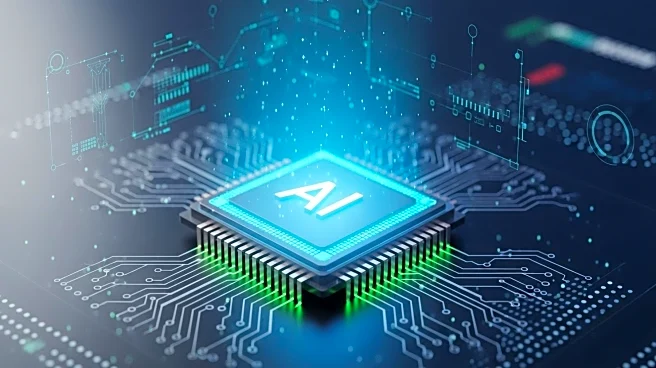What's Happening?
Tesla has announced a strategic shift in its AI development by discontinuing its Dojo supercomputer project and focusing on AI5 and AI6 inference chips. This decision, made public in August 2025, marks a significant change in Tesla's approach to AI and autonomous driving technology. The Dojo project, initially aimed at enhancing AI training capabilities, faced challenges due to inefficiencies in maintaining separate chip architectures for training and inference. As a result, Tesla has decided to consolidate its efforts on AI5 and AI6 chips, which are designed to streamline operations and reduce costs. The AI6 chip, in particular, is noted for its dual capabilities in both inference and training, aligning with industry trends that prioritize inference workloads in real-time decision-making for autonomous vehicles.
Why It's Important?
This strategic pivot is crucial for Tesla as it seeks to maintain its leadership in the autonomous driving sector. By focusing on a unified chip architecture, Tesla aims to enhance efficiency and scalability, which are vital for the mass deployment of its Full Self-Driving (FSD) technology. The partnership with Samsung for the AI6 chip's production ensures access to advanced manufacturing processes, potentially lowering costs and increasing supply chain resilience. This move could significantly impact Tesla's market valuation, as successful implementation of these chips could lead to increased revenue from FSD subscriptions and other AI-driven applications. However, the reliance on external partners like Samsung and Nvidia introduces potential risks, such as supply chain disruptions.
What's Next?
Tesla's next steps involve the real-world application of the AI6 chip in its vehicles and other AI projects. The company will need to demonstrate the chip's effectiveness in improving autonomous driving capabilities and reducing costs. Investors and industry analysts will closely monitor Tesla's ability to leverage its partnership with Samsung to achieve economies of scale. Additionally, Tesla's strategy of outsourcing large-scale training while maintaining control over inference capabilities will be tested in the coming months. The success of this approach could solidify Tesla's position as a leader in AI-driven mobility solutions.
Beyond the Headlines
The shift from Dojo to AI5/AI6 chips also highlights a broader industry trend towards inference-centric architectures in AI applications. This change reflects a growing emphasis on real-time data processing and decision-making capabilities, which are essential for autonomous systems. Tesla's decision to embrace external partnerships for training infrastructure suggests a pragmatic approach to balancing cost-effectiveness with performance. The formation of DensityAI, a startup by former Dojo team members, indicates a dynamic talent landscape in the AI sector, where expertise is fluid and adaptable to market demands.











